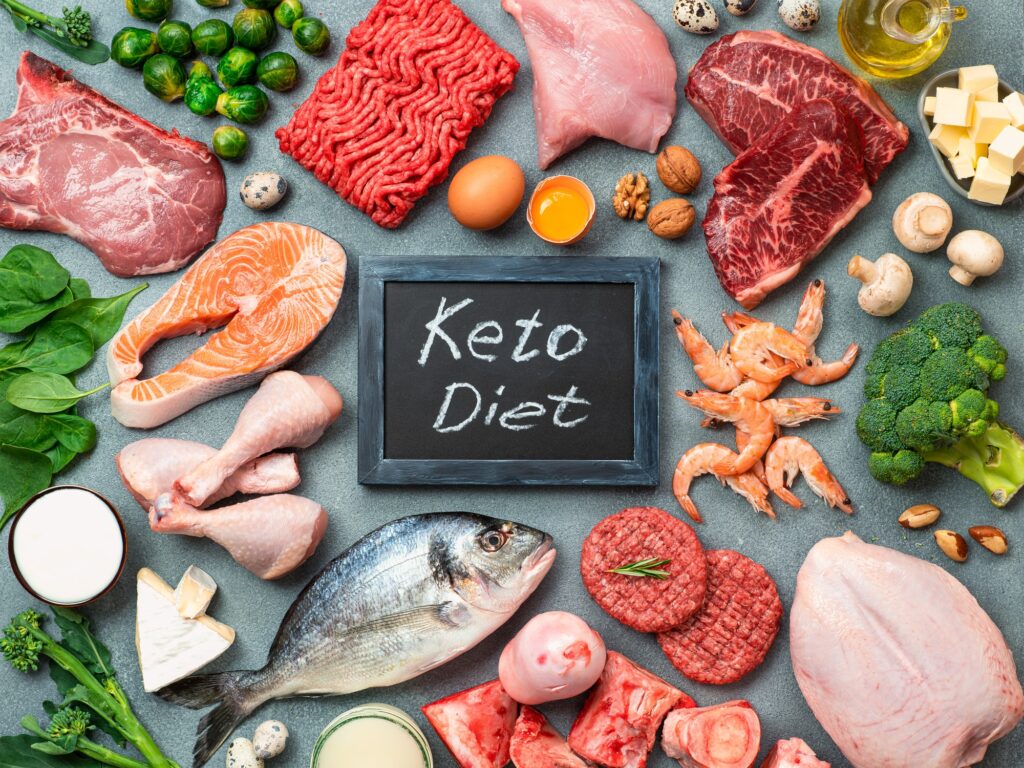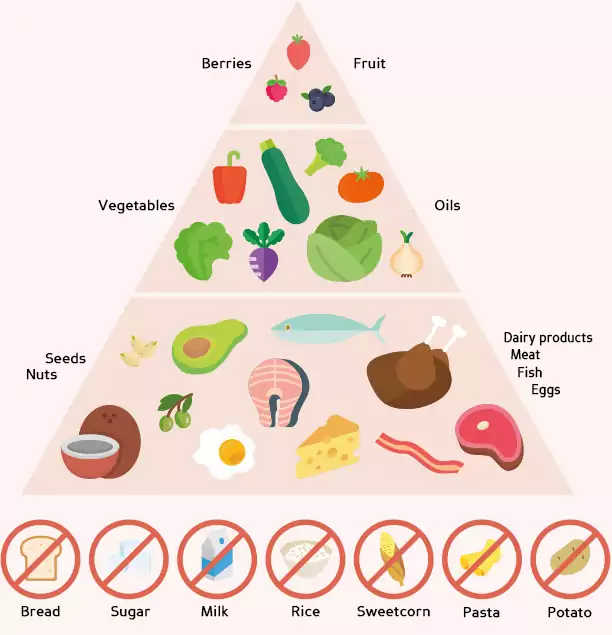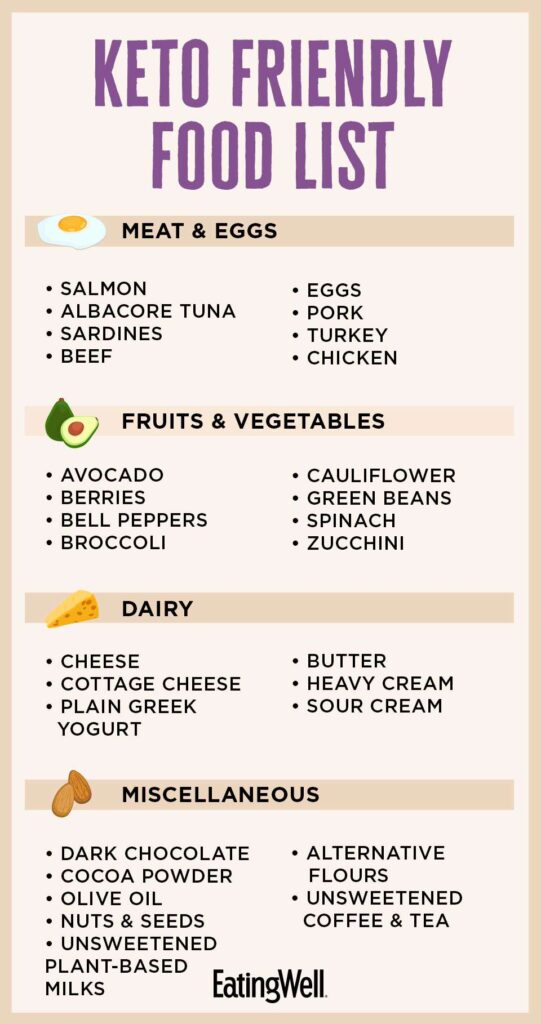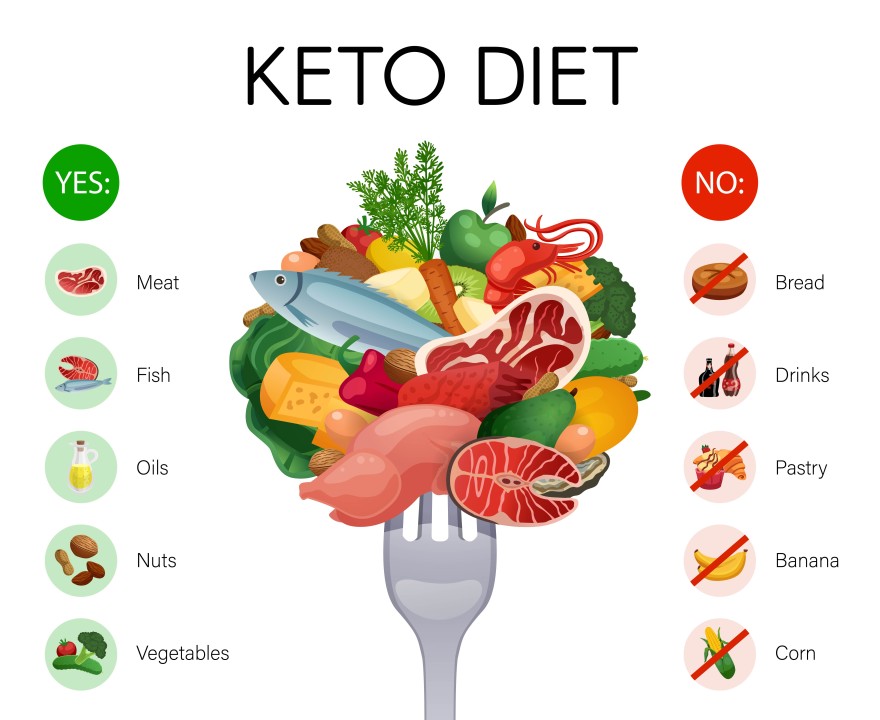The high fat nature of a keto diet might help stabilize blood sugar and support weight loss, but there are also some significant risks to be aware of.
Originally developed to treat epilepsy in kids, the keto diet has gained massive popularity as an eating plan for weight loss. Social media influencers and coaches alike tout the endless benefits of the high fat nutrition strategy. But do their claims hold up?
While proponents of the diet will give you a laundry list of perks, like mental clarity and reduced inflammation, the reality of keto’s perks is a bit more complicated. And it’s important to be aware of the risks and disadvantages, too.
So, what are the real pros and cons of a keto diet, and should you give it a try? Read on to learn more.

What does it actually look like?
You probably know keto as a high fat, low carb fat diet. But it’s very high fat — and likely much higher than you think.
There are two types of keto: standard and therapeuticTrusted Source. Standard is what you might try if you want to do keto for general health and weight loss, and therapeutic is used by healthcare professionals when treating conditions like epilepsy. Their macro breakdowns look slightly different:
| Standard | Therapeutic |
|---|---|
| 75% fat | 90% fat |
| 20% protein | 5% protein |
| 5% carbs | 5% carbs |
Keep in mind that keto isn’t the same thing as a standard low carb diet. Most low carb diets aim to keep carbs under 150 grams (g) per day, which is equivalent to about 6 bananasTrusted Source. On a keto diet, you’ll be sticking to under 50 g per day, which is necessary to reach ketosis.
The metabolic state ketosis is where the diet’s purported health benefits come from. Once your body processes fats in the liver, it produces ketone bodiesTrusted Source, molecules that can be used for energy. However, you can only reach ketosis once your body has used up all its available carbs.

Potential benefits of a keto diet
Helps with faster weight loss
While this sounds promising, there’s an immediate caveat — basically all the research on keto for weight loss has been done on people with obesity. So if you’re looking to use this diet to lose the last 5 pounds, you may not see the same results.
But for people with a significant amount of excess body weight, a keto diet can be an effective choice for weight loss.
There are a few reasons for this. First, cutting carbs means you’ll drop water weight, which you’ll see quickly on the scale. After the first couple of weeks, this rapid “weight loss” will slow to a more normal pace.
While this initial drop in pounds isn’t fat loss, the fast results can be a motivating factor for many people, helping them continue with the diet. Research Trusted Source also suggests that certain types of ketones released during ketosis may play a role in appetite suppression, which can make it easier to stick to a calorie deficit.
Eating low carb foods might also make it easier for your body to burn fat. According to research from 2022Trusted Source, keto may reduce insulin spikes. Insulin stops lipolysis, the process by which your body breaks down stored fat, so keeping blood sugar levels stable might make losing body fat easier.
Can help with blood sugar management in type 2 diabetes

There’s been a lot of research on keto for type 2 diabetes, and for good reason. Low carb diets have been a mainstay of diabetes management, and they were recommended well before injectable insulin became available.
So while low carb diets for diabetes are nothing new, keto provides a novel approach by upping the fat content. It’s well established in the researchTrusted Source that keto and low carb diets can help stabilize blood sugar, but there may actually be more potential benefits at play.
One 2019 studyTrusted Source found that a keto diet reversed type 2 diabetes in some participants, and after a 2-year follow-up, many participants had improvements in their diabetes blood markers. Among participants, there was a diabetes remission rate of 17.6%.
However, the diet isn’t without its drawbacks. A 2021 meta-analysisTrusted Source found that the benefits seemed to decrease after 1 year, and many participants found it hard to stick to for a long period of time. This means that a slightly less restrictive, sustainable eating plan may yield better long-term results.
May ‘starve’ cancer cells of energy
While the research on keto as part of cancer treatment is new — and highly controversial — some small studies have shown possible benefits.
The idea behind this is related to something called the Warburg effectTrusted Source. This claims that there are metabolic changes in cancer cells that mean they primarily use glucose (carbs) for energy, even when oxygen is available.
Theoretically, a keto diet that cuts down on carbs and forces the body to rely on fat for fuel might “starve” cancer cells. This could potentially weaken cancer cells, making them more susceptible to chemotherapy and radiation, while protecting normal cells.
One small 2023 studyTrusted Source found a better overall survival rate in participants who continued the keto diet for longer, but experts note that this research is still in its early stages.
May reduce your risk of cardiovascular disease
Like many of the potential benefits of keto, the research on this is also conflicting, but some experts claim that keto could be good for heart health.
While a 2023 meta-analysisTrusted Source showed a decrease in blood triglycerides, it also showed increases in both HDL (good) cholesterol and LDL (bad) cholesterol. Another showedTrusted Source no significant increase in LDL.
It’s thought that the makeup of your keto dietTrusted Source plays a role in changes to triglycerides, HDL, and LDL. For example, eating more saturated fat can cause an increase in LDL, which is bad for heart health. But eating more healthy unsaturated fats like avocado and salmon can increase HDL, which is good for heart health.
Therefore, it’s perhaps not so much the keto diet itself that directly improves blood markers for cardiovascular health, but rather the types of fats you’re eating on a daily basis.

Downsides of a keto diet
Can cause nutrient deficiencies
Because the keto diet limits carbs to just 50 g, it doesn’t leave room to include many fruits or vegetables. These are your body’s primary source of essential vitamins and minerals, all of which play a role in keeping your cells healthy.
Most notably, keto diets are often lowTrusted Source in vitamins A, E, and B6, as well as folate, calcium, magnesium, potassium, and iron.
If you’re trying keto, you can mitigate some of these deficiencies by eating plenty of low carb vegetables like leafy greens, broccoli, asparagus, and zucchini. It’s also a good idea to work with a registered dietitian if you’re planning on following the diet for an extended period of time.
May cause digestive issues
Staying low carb means you won’t be eating many beans, lentils, or whole grains, which are all good sources of fiber. This can lead to constipation and slow digestion.
Consuming so much fat can also be tough on your digestive system. Many people who try keto experience gastrointestinal (GI) issues like diarrhea, cramping, bloating, and stomach upset.
Could be bad for heart health
While we discussed the possible benefits on heart health earlier, we also touched on the risks. If you’re eating a keto diet that’s high in sources of saturated fat — like meat, cheese, and butter — you’re at risk of harming your heart health.
Saturated fat is known to increase levels of LDL (bad) cholesterol, which can clog your arteries. This is associated with heart and cardiovascular disease.
Can be hard to stick to
Sticking to a keto diet can be tricky, and it’s not easy to do long term. There’s also no long-term data on its safety, so it’s not something you’d want to do without the supervision of a healthcare professional.
Following a keto diet requires a lot of meal planning and food preparation, and this can be incredibly challenging for people with busy jobs and families. It’s also hard to find keto-friendly options at restaurants and social gatherings, so some people find it negatively affects their social life.
If you find that a lower carb style of eating feels good for your body, trying a more relaxed approach — like a low carb Mediterranean style diet — might be a simpler, more sustainable choice.
Benefits of Mediterranean and keto diets
Both the Mediterranean diet and ketogenic diet have been associated with several health benefits.
May support heart health
The Mediterranean diet is perhaps most well-known for its ability to support heart health.
For instance, one large review of 41 studies found that adherence to a Mediterranean diet was linked to a lower risk of heart disease and stroke
Studies also show that the Mediterranean diet could help decrease blood pressure levels and protect against plaque buildup in the arteries, both of which can contribute to heart disease
Research on the relationship between the keto diet and heart health has turned up mixed results. Some studies show that the keto diet could potentially reduce levels of total and low density lipoprotein
However, keep in mind that this may depend on several factors, and other studies have found that the ketogenic diet could actually increase levels of LDL cholesterol, which can contribute to the buildup of plaque in the arteries and block bloodflow to your heart
The extent of the keto diet’s effects on heart health may also depend on the types of foods that you include in your diet, as many high fat ingredients often included in the diet — such as processed meats — are actually associated with an increased risk of heart disease
Plus, some people’s bodies respond differently to dietary cholesterol, which may also have an effect on heart healt
May support blood sugar management
The Mediterranean diet encourages a variety of nutrient-dense, high fiber foods, which could help stabilize blood sugar levels
Research shows that the Mediterranean diet can improve blood sugar management and may be associated with a lower risk of developing type 2 diabetes
The keto diet has also been shown to improve blood sugar management in people with type 2 diabetes
According to one small study in 30 people with diabetes, 26% of those who followed a very low calorie keto diet for 12 months were able to stop taking all diabetes medication
Both diets may help support insulin sensitivity as well. In fact, one study found that both a Mediterranean diet and low carb diet were similarly effective at reducing insulin resistance, a condition that impairs the body’s ability to regulate blood sugar levels
However, the low carb diet in the study was about 30% carbs, which is much higher in carbs in a typical keto diet. Therefore, it’s unclear how much benefit, if any, the the keto diet may offer when it comes to supporting insulin sensitivity.
May support healthy brain function
Some research suggests that the Mediterranean diet may help support brain health as you get older.
For instance, one study found that greater adherence to the Mediterranean diet was associated with decreased markers of cognitive decline and dementia in older adults
Another study concluded that the Mediterranean diet could be linked to improved brain function and memory, as well as a reduction in symptoms of depression, in older adults
The ketogenic diet has also been studied for its ability to enhance brain health.
In fact, the ketone bodies that are produced as an alternative source of energy on the keto diet may have neuroprotective properties and are even being studied for their ability to protect against conditions like Alzheimer’s disease
16 food to avoid on Keto Diet
If you’re looking to maintain ketosis, you may need to avoid or reduce portion sizes of some foods, including refined carbs, starchy vegetables, and certain fruits.
The keto diet is an extremely low carb, high fat diet.
The goal is to achieve a metabolic state of ketosis, in which your body burns mostly fat instead of carbs for energy
While controversial and not for everyone, the keto diet has been linked to weight loss and potential short-term health benefits like improved blood pressure
If you’re looking to begin or maintain ketosis, there are some foods to avoid — specifically, foods that are too high in carbs.
The structure of carb molecules is simple, making them easy for your body to break down. Thus, they’re an efficient source of energy. If your body is provided a lot of carbs, especially at once, it will do what’s most efficient: use carbs instead of fat for energy
On the keto diet, carbs are typically restricted to 20–50 grams per day. Generally, this total doesn’t tally the portion of carbs made up of dietary fiber, as these aren’t digested by your body
On a 2,000-calorie diet, a keto diet will typically be composed of 55–60% fat, 30–35% protein, and 5–10% carbs
Here are 16 foods to avoid or limit on the keto diet, some of which might surprise you.
The bottom line
While proponents of the keto diet may shout about its endless benefits, there are some important risks to be aware of. For instance, eating a high fat diet can negatively affect your heart health and cause GI issues. There’s also no long-term data on the safety of keto.
However, for people with obesity and type 2 diabetes, the benefits of keto might outweigh the risks.
If you want to try keto, it’s a good idea to speak with your doctor or a dietitian, especially if you have any health conditions. They can advise you on how to do the diet as safely and sustainably as possible.


